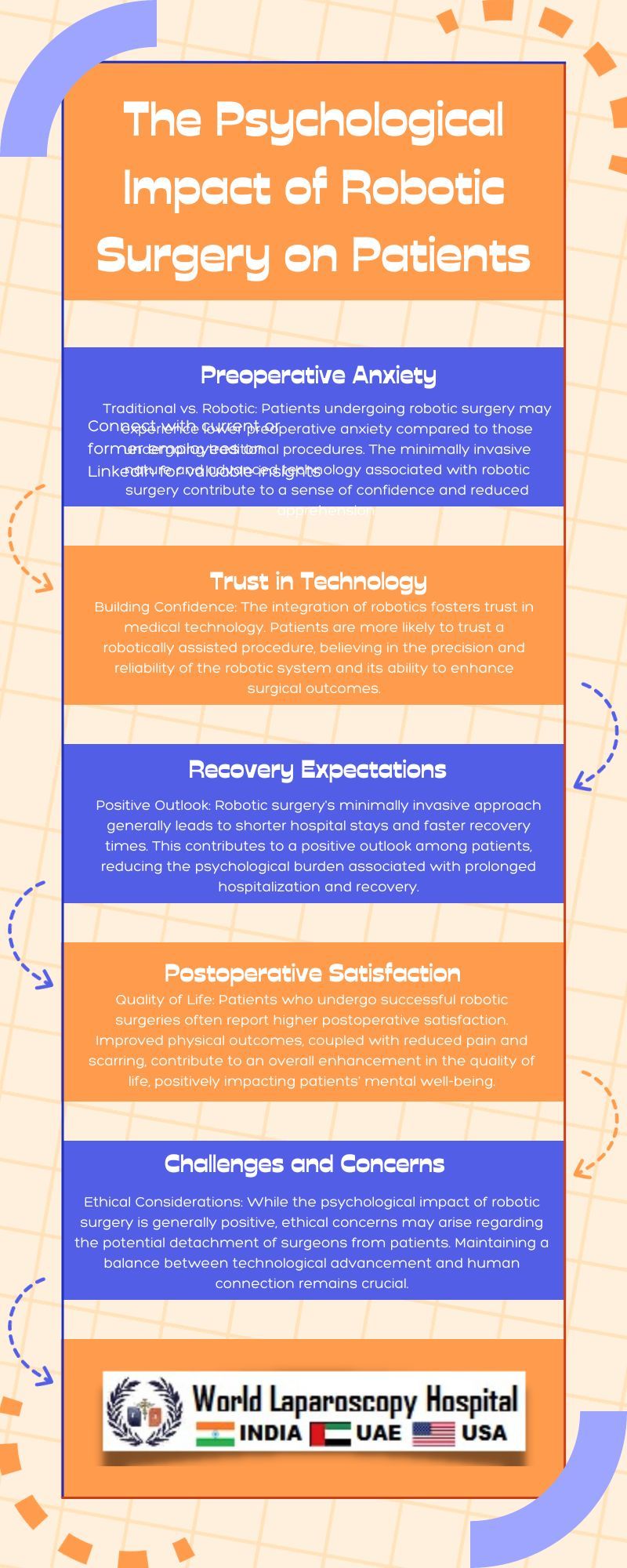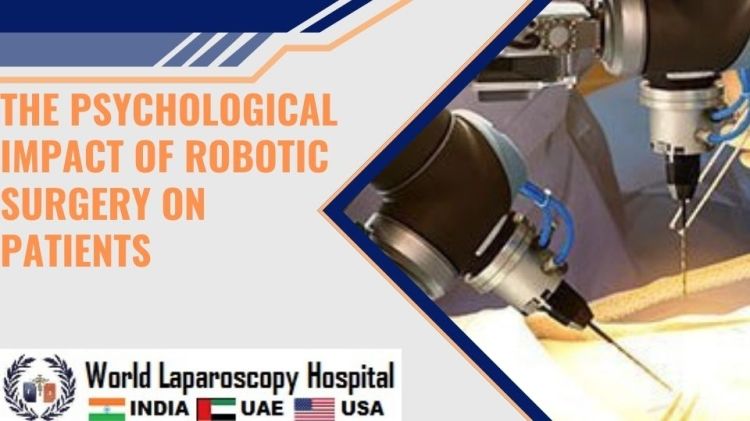The Psychological Impact of Robotic Surgery on Patients
The Psychological Impact of Robotic Surgery on Patients
Introduction:
In recent years, technological advancements have revolutionized the field of medicine, with robotic surgery emerging as a cutting-edge technique. While this innovative approach offers numerous benefits in terms of precision and efficiency, it also brings forth a complex array of psychological implications for patients. This article delves into the multifaceted psychological impact of robotic surgery on individuals, exploring the various dimensions of emotions, perceptions, and adaptations that patients undergo throughout the entire surgical process.

Understanding Robotic Surgery:
Robotic surgery involves the use of robotic systems to assist surgeons in performing intricate procedures with enhanced precision. The technology allows for smaller incisions, reduced blood loss, and quicker recovery times compared to traditional surgical methods. As this technique becomes increasingly prevalent, it is imperative to examine the psychological aspects that accompany the physical aspects of undergoing such a transformative medical experience.
Anticipation and Anxiety:
One of the primary psychological dimensions of robotic surgery is the anticipation leading up to the procedure. Patients often grapple with a mix of emotions, ranging from curiosity about the novel technology to anxiety about the unknown. The unfamiliarity of robotic surgery can evoke fear, and patients may harbor concerns about potential complications or the reliability of the technology.
To address these concerns, healthcare providers play a crucial role in educating patients about the robotic surgery process. Transparent communication about the benefits, risks, and expected outcomes can help alleviate anxiety and empower patients to make informed decisions. Moreover, offering opportunities for patients to interact with the robotic system or providing virtual simulations can demystify the technology, fostering a sense of control and familiarity.
Trust in Technology and Surgeons:
Establishing trust is paramount in the realm of healthcare, and the introduction of robotic surgery requires patients to place trust not only in their surgeons but also in the advanced technology guiding the procedure. This trust dynamic involves a delicate balance between the human expertise of the surgeon and the mechanical precision of the robotic system.
Research indicates that patients who perceive the technology as reliable and their surgeons as competent tend to experience lower levels of anxiety. Therefore, fostering trust involves comprehensive preoperative discussions, where surgeons emphasize their expertise, the system's track record, and the collaborative nature of robotic surgery. Building this trust contributes to a positive psychological outlook, reducing apprehension and facilitating a smoother psychological transition into the surgical experience.
Empowerment and Control:
Robotic surgery introduces a sense of empowerment for patients, as the technology allows for minimally invasive procedures and faster recovery times. This newfound empowerment can positively impact patients' psychological well-being, enhancing their perception of control over their health outcomes.
Patients who feel actively involved in the decision-making process and understand the nuances of robotic surgery are more likely to experience a sense of control. Empowering patients through education and involvement in preoperative discussions can cultivate a proactive mindset, mitigating feelings of helplessness and enhancing their overall psychological resilience throughout the surgical journey.
Postoperative Satisfaction and Adjustment:
The postoperative phase plays a crucial role in shaping patients' long-term psychological experiences with robotic surgery. Swift recovery, reduced pain, and improved surgical outcomes contribute to heightened postoperative satisfaction. Patients who experience positive outcomes are more likely to view the entire surgical process as a success, influencing their overall perception of the technology and their healthcare providers.
However, it is essential to acknowledge that not all patients have uniform experiences. Complications or unexpected outcomes can lead to a range of emotions, from disappointment to anxiety about the future. Postoperative psychological support, including counseling and follow-up discussions with healthcare providers, is vital in helping patients navigate these emotions and adjust to the reality of their post-surgical condition.
Impact on Quality of Life and Mental Well-being:
Beyond the immediate postoperative period, the psychological impact of robotic surgery extends to long-term considerations, particularly concerning the patients' quality of life and mental well-being. Studies have suggested that patients who undergo successful robotic surgeries often experience improved quality of life due to reduced pain, shorter recovery times, and fewer postoperative complications.
However, it is crucial to recognize that psychological challenges may persist, especially if patients face unexpected complications or have unrealistic expectations regarding the outcomes of robotic surgery. Ongoing support, both from healthcare professionals and within the patient's social network, is essential in addressing any lingering psychological issues and facilitating a positive adjustment to post-surgical life.
Ethical Considerations and Informed Consent:
As the field of robotic surgery advances, ethical considerations surrounding informed consent become increasingly significant. Ensuring that patients have a comprehensive understanding of the robotic surgical process, its potential risks, and alternative treatment options is essential for fostering trust and respecting patients' autonomy.
Healthcare providers must navigate the ethical landscape by prioritizing transparent communication and shared decision-making. This approach not only aligns with the principles of medical ethics but also contributes to a positive psychological experience for patients, who feel actively involved in shaping their treatment journey.
Conclusion:
Robotic surgery represents a paradigm shift in the landscape of medical interventions, offering unprecedented precision and efficiency. However, this transformative technology brings forth a nuanced set of psychological implications for patients. From the anticipation leading up to the procedure to the postoperative adjustment period, patients undergo a complex interplay of emotions, perceptions, and adaptations.
Addressing the psychological impact of robotic surgery requires a holistic approach that encompasses transparent communication, trust-building, and ongoing support. By understanding and addressing the psychological dimensions of this innovative surgical technique, healthcare providers can enhance patient experiences, foster positive outcomes, and contribute to the continued evolution of robotic surgery in the realm of modern medicine.
Top
Introduction:
In recent years, technological advancements have revolutionized the field of medicine, with robotic surgery emerging as a cutting-edge technique. While this innovative approach offers numerous benefits in terms of precision and efficiency, it also brings forth a complex array of psychological implications for patients. This article delves into the multifaceted psychological impact of robotic surgery on individuals, exploring the various dimensions of emotions, perceptions, and adaptations that patients undergo throughout the entire surgical process.

Understanding Robotic Surgery:
Robotic surgery involves the use of robotic systems to assist surgeons in performing intricate procedures with enhanced precision. The technology allows for smaller incisions, reduced blood loss, and quicker recovery times compared to traditional surgical methods. As this technique becomes increasingly prevalent, it is imperative to examine the psychological aspects that accompany the physical aspects of undergoing such a transformative medical experience.
Anticipation and Anxiety:
One of the primary psychological dimensions of robotic surgery is the anticipation leading up to the procedure. Patients often grapple with a mix of emotions, ranging from curiosity about the novel technology to anxiety about the unknown. The unfamiliarity of robotic surgery can evoke fear, and patients may harbor concerns about potential complications or the reliability of the technology.
To address these concerns, healthcare providers play a crucial role in educating patients about the robotic surgery process. Transparent communication about the benefits, risks, and expected outcomes can help alleviate anxiety and empower patients to make informed decisions. Moreover, offering opportunities for patients to interact with the robotic system or providing virtual simulations can demystify the technology, fostering a sense of control and familiarity.
Trust in Technology and Surgeons:
Establishing trust is paramount in the realm of healthcare, and the introduction of robotic surgery requires patients to place trust not only in their surgeons but also in the advanced technology guiding the procedure. This trust dynamic involves a delicate balance between the human expertise of the surgeon and the mechanical precision of the robotic system.
Research indicates that patients who perceive the technology as reliable and their surgeons as competent tend to experience lower levels of anxiety. Therefore, fostering trust involves comprehensive preoperative discussions, where surgeons emphasize their expertise, the system's track record, and the collaborative nature of robotic surgery. Building this trust contributes to a positive psychological outlook, reducing apprehension and facilitating a smoother psychological transition into the surgical experience.
Empowerment and Control:
Robotic surgery introduces a sense of empowerment for patients, as the technology allows for minimally invasive procedures and faster recovery times. This newfound empowerment can positively impact patients' psychological well-being, enhancing their perception of control over their health outcomes.
Patients who feel actively involved in the decision-making process and understand the nuances of robotic surgery are more likely to experience a sense of control. Empowering patients through education and involvement in preoperative discussions can cultivate a proactive mindset, mitigating feelings of helplessness and enhancing their overall psychological resilience throughout the surgical journey.
Postoperative Satisfaction and Adjustment:
The postoperative phase plays a crucial role in shaping patients' long-term psychological experiences with robotic surgery. Swift recovery, reduced pain, and improved surgical outcomes contribute to heightened postoperative satisfaction. Patients who experience positive outcomes are more likely to view the entire surgical process as a success, influencing their overall perception of the technology and their healthcare providers.
However, it is essential to acknowledge that not all patients have uniform experiences. Complications or unexpected outcomes can lead to a range of emotions, from disappointment to anxiety about the future. Postoperative psychological support, including counseling and follow-up discussions with healthcare providers, is vital in helping patients navigate these emotions and adjust to the reality of their post-surgical condition.
Impact on Quality of Life and Mental Well-being:
Beyond the immediate postoperative period, the psychological impact of robotic surgery extends to long-term considerations, particularly concerning the patients' quality of life and mental well-being. Studies have suggested that patients who undergo successful robotic surgeries often experience improved quality of life due to reduced pain, shorter recovery times, and fewer postoperative complications.
However, it is crucial to recognize that psychological challenges may persist, especially if patients face unexpected complications or have unrealistic expectations regarding the outcomes of robotic surgery. Ongoing support, both from healthcare professionals and within the patient's social network, is essential in addressing any lingering psychological issues and facilitating a positive adjustment to post-surgical life.
Ethical Considerations and Informed Consent:
As the field of robotic surgery advances, ethical considerations surrounding informed consent become increasingly significant. Ensuring that patients have a comprehensive understanding of the robotic surgical process, its potential risks, and alternative treatment options is essential for fostering trust and respecting patients' autonomy.
Healthcare providers must navigate the ethical landscape by prioritizing transparent communication and shared decision-making. This approach not only aligns with the principles of medical ethics but also contributes to a positive psychological experience for patients, who feel actively involved in shaping their treatment journey.
Conclusion:
Robotic surgery represents a paradigm shift in the landscape of medical interventions, offering unprecedented precision and efficiency. However, this transformative technology brings forth a nuanced set of psychological implications for patients. From the anticipation leading up to the procedure to the postoperative adjustment period, patients undergo a complex interplay of emotions, perceptions, and adaptations.
Addressing the psychological impact of robotic surgery requires a holistic approach that encompasses transparent communication, trust-building, and ongoing support. By understanding and addressing the psychological dimensions of this innovative surgical technique, healthcare providers can enhance patient experiences, foster positive outcomes, and contribute to the continued evolution of robotic surgery in the realm of modern medicine.
